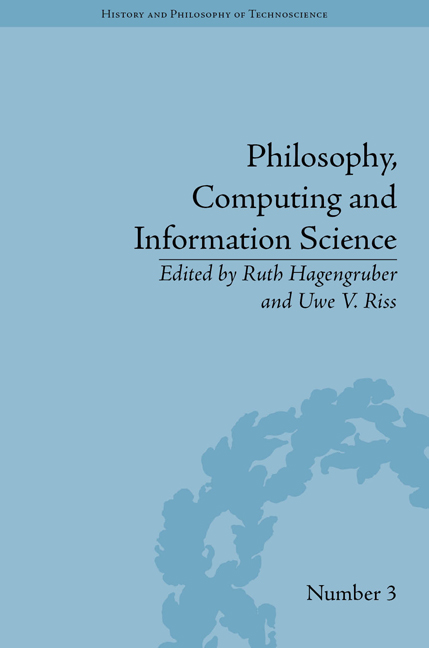Book contents
- Frontmatter
- CONTENTS
- List of Contributors
- List of Figures and Tables
- Introduction: Philosophy's Relevance in Computing and Information Science
- Part I Philosophy of Computing and Information
- 1 The Fourth Revolution in our Self-Understanding
- 2 Information Transfer as a Metaphor
- 3 With Aristotle towards a Differentiated Concept of Information?
- 4 The Influence of Philosophy on the Understanding of Computing and Information
- Part II Complexity and System Theory
- Part III Ontology
- Part IV Knowledge Representation
- Part V Action Theory
- Part VI Info-Computationalism
- Part VII Ethics
- Notes
- Index
1 - The Fourth Revolution in our Self-Understanding
from Part I - Philosophy of Computing and Information
- Frontmatter
- CONTENTS
- List of Contributors
- List of Figures and Tables
- Introduction: Philosophy's Relevance in Computing and Information Science
- Part I Philosophy of Computing and Information
- 1 The Fourth Revolution in our Self-Understanding
- 2 Information Transfer as a Metaphor
- 3 With Aristotle towards a Differentiated Concept of Information?
- 4 The Influence of Philosophy on the Understanding of Computing and Information
- Part II Complexity and System Theory
- Part III Ontology
- Part IV Knowledge Representation
- Part V Action Theory
- Part VI Info-Computationalism
- Part VII Ethics
- Notes
- Index
Summary
The First Three Revolutions
To oversimplify, science has two fundamental ways of changing our understanding. One may be called extrovert, or about the world, and the other introvert, or about ourselves. Three scientific revolutions in the past had great impact both extrovertly and introvertly. In changing our understanding of the external world, they also modified our conception of who we are, that is, our self-understanding. The story is well known, so I shall recount it rather quickly.
We used to think that we were at the centre of the universe, nicely placed there by a creator God. It was a most comfortable and reassuring position to hold. In 1543, Nicolaus Copernicus published his treatise on the movements of planets around the sun. It was entitled On the Revolutions of Celestial Bodies (De Revolutionibus Orbium Coelestium). Copernicus probably did not mean to start a ‘revolution’ in our self-understanding as well. Nonetheless, his heliocentric cosmology forever displaced the earth from the centre of the universe and made us reconsider, quite literally, our own place and role in it. It caused such a profound change in our views of the universe that the word ‘revolution’ begun to be associated with radical scientific transformation.
We have been dealing with the consequences of the Copernican revolution since its occurrence. Indeed, it is often remarked that one of the significant achievements of our space explorations has been a matter of external and comprehensive reflection on our human condition.
- Type
- Chapter
- Information
- Philosophy, Computing and Information Science , pp. 19 - 28Publisher: Pickering & ChattoFirst published in: 2014



